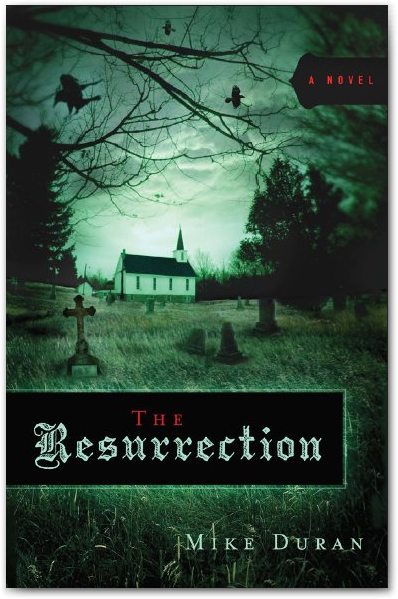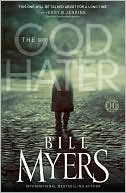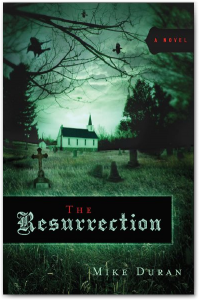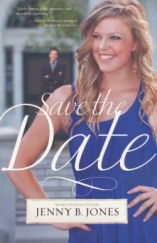
by Jason Joyner | Mar 1, 2011 | Blog, christian fiction, Mike Duran, one coffin slightly used, speculative fiction
What happens to a pastor who may be losing his faith when a resurrection happens in his town?
Last week we had another interesting Christian Sci-fi/Fantasy Tour with the book The God Hater. This book was based around a specific message, with the story enveloping it. It was overall popular with the tour, with me in the minority view that the story didn’t carry the potent message.
I did a little compare/contrast with the book I read just following The God Hater, Mike Duran’s debut novel The Resurrection. Mike’s blog is one that I frequent, and have often linked from here for his thought-provoking articles on Christian fiction. I promised a review of Mike’s book afterwards, so here we go.
Reverend Ian Clark is ready to resign his post at Canyon Springs Community Church, being haunted in multiple ways by failures in his past and by his rising doubt. Ruby Case is a young mother with a lifelong limp, a steadfast faith, yet a weariness that there is not more life in their church.
Little does Ruby know how she will help bring life back to Canyon Springs.
When she visits the funeral of a friend’s young son, she isn’t expecting a miracle. But when the boy sits up after she touches him, a firestorm is lit in this quiet California town. Some people come to Ruby for their own miracle. Some denounce her and the resurrection as a fraud.
Rev. Clark must wrestle with his questions, while both he and Ruby find that other forces do not take kindly to invasion of their dark territory. As the back copy of the book states: When the dead come back to life, someone must pay the price…
Mike Duran is a pastor who has hit the place of burnout in ministry, something I’m realizing comes all too often for a profession that doesn’t get allowance for struggle or failure. Moved to minister through the power of fiction, he has written a dynamic and haunting first novel that is an excellent exploration of faith, doubt, and the collision between the two.
The story carries an ominous tone throughout, keeping the suspense high as the reader always wonders when something bad might happen. We know books are supposed to have happy endings, but Mike manages to keep the outcome in question up until the climax, which isn’t an easy feat. The characters have real struggles. Ruby didn’t want to become a miracle worker, and she is challenged when others’ expectations are that she can turn the power on at will. She wants to help people, but doesn’t have “the formula” handy. Meanwhile young Rev. Clark wrestles with powers both worldly and spiritual as he’s forced to confront his doubt instead of nursing it to a full denial of his beliefs.
Ruby is a well-rounded person. I felt a lot of connect with her. Rev. Clark was a little distant, without quite as much depth of character as I would have liked. There’s not much on his life outside of being a smart but conflicted minister. Still, he is honest in his queries, and he probably represents a lot of pastors with his concerns. Other characters in the book are vivid and unique, keeping the fictional Canyon Springs grounded as a real place.
There are a lot of ideas in this book. Mike does a good job of bringing them into the story organically. Little seems forced, although there are times when the explanation of the religious theories undergirding the plot get a little too thick. Otherwise, he has a gift for description, and I felt like I was in California with the pictures of local flora and the atmosphere of the town were evocative. There’s a few glitches in the craft, like any new author would face, that are minor and shouldn’t distract from this enjoyable fiction escape.
I’ve followed Mike’s blog for a long time, and I was excited to see him get a contract. My curiosity could finally be satisfied whether his fiction talents matched his thoughtful blogging style. I’m happy to say that The Resurrection sucked me in, made me think, and has stayed with me after two weeks of finishing. The book is a suspenseful exploration of deep questions of faith, while giving hope in the power of Jesus to touch lives today, even in the darkest night.
—

by Jason Joyner | Feb 23, 2011 | Blog, CFBA, christian fiction, guys can enjoy romance too, Jenny B Jones is funny
 We interrupt this blog tour with another blog tour.
We interrupt this blog tour with another blog tour.
I also review for the Christian Fiction Blog Alliance. This week they are featuring Jenny B. Jones and her latest book, Save the Date.
I hope it has been established now that I’m a dude. I like explosions, football collisions, and helicopter/car chases. All three mashed together is awesome sauce.
I found out about Jenny B. Jones through Chip MacGregor, fiction agent extraordinare who is enough of a dude that he wears a kilt. In public. He highlighted her as a very funny writer. So I decided to get her book to review, likely having my wife read it.
*Ahem*
I didn’t get it in time to finish it for the tour, but I am laughing out loud while reading it. And it is a ROMANCE. Now, it does have an ex-football player, which gives it a few manly points, but note that he is an EX. I don’t care. I’m enjoying her writing style, the prose, the witty sense of humor. And I really want to see what happens to Lucy and her girls’ home.
*Sniff*
Take that for what it’s worth, and check out her book.
—
(Time to blow something up…virtually…like in a video game…hey, don’t look at me like I’m weird…)
—

by Jason Joyner | Feb 23, 2011 | Blog, CFBA, christian fiction, guys can enjoy romance too, Jenny B Jones is funny
 We interrupt this blog tour with another blog tour.
We interrupt this blog tour with another blog tour.
I also review for the Christian Fiction Blog Alliance. This week they are featuring Jenny B. Jones and her latest book, Save the Date.
I hope it has been established now that I’m a dude. I like explosions, football collisions, and helicopter/car chases. All three mashed together is awesome sauce.
I found out about Jenny B. Jones through Chip MacGregor, fiction agent extraordinare who is enough of a dude that he wears a kilt. In public. He highlighted her as a very funny writer. So I decided to get her book to review, likely having my wife read it.
*Ahem*
I didn’t get it in time to finish it for the tour, but I am laughing out loud while reading it. And it is a ROMANCE. Now, it does have an ex-football player, which gives it a few manly points, but note that he is an EX. I don’t care. I’m enjoying her writing style, the prose, the witty sense of humor. And I really want to see what happens to Lucy and her girls’ home.
*Sniff*
Take that for what it’s worth, and check out her book.
—
(Time to blow something up…virtually…like in a video game…hey, don’t look at me like I’m weird…)
—

by Jason Joyner | Feb 22, 2011 | Blog, christian fiction, reviews, speculative fiction, writing craft
Welcome back to the CSFF Tour for February. This month’s featured book is The God Hater by Bill Myers.
For a synopsis, check out yesterday’s post introducing the book.
This book fits a “speculative fiction” category by supposing that we can build an artificial computer world, with completely independent artificial intelligence, that can be used to see how humanity will respond to variables and make better predictions.
My prediction is that this book will do well with general Christian fiction (specifically CBA readers). And that is perhaps a shame.
This book is written for a purpose. It has a specific aim – to show the logic God used in creating our world and the need for divine intervention (per the Questions to the Author in the back of the book). The book is designed to be a challenge to the New Atheists who are challenging Christian belief with old arguments and renewed fervor. It is a noble purpose, certainly. From a personal standpoint I would love to see it succeed.
Reviewing it for artistic purposes is another story.
Often Christian art is considered to be in one of two categories: it is made with creativity as the primary goal, and the theme taken from the book is incidental, or it is made with a message as the anchor, and the story is conceived and created around it. I don’t think it is necessarily bad to have a book written with the second point as the motivation, but it means that the story will require a very deft touch to make the work stand on artistic merits, apart from the theme (however holy it may be).
The God Haters, in my opinion, fails to rise above the forced preconceptions and stand as a quality piece of fiction. The story suffers from several flaws. The characters are generally 2D cut-outs, created to hold a place in the story without much depth or empathy. The Christian professor Annie escapes this to a degree, but she doesn’t carry enough of the story to overcome the other flat people. He uses several writing techniques that jarred me out of the imaginary world he was attempting to create, from using parentheses for several asides to a character with an annoying vocal tic (“bro!”). There were also a couple of scientific mistakes that threw me as a biology major, but that is me being overly picky.
The suspense and plot is pulled along well enough, and isn’t all that bad. It just isn’t all that good either. I didn’t get bored, but I wasn’t invested in what was happening. There are some touching moments as he delves into the computer simulation and the professor’s avatar gains more and more compassion for the “creation,” but it is too little, too late to save the book. A major issue seems to be that the book is too short to give the depth needed to make everything more believable. Perhaps it would be a different story if it had the length to give the depth required.
The book gives the whole back copy to quotes of endorsements. There’s no place to get a synopsis of the book, and I think that will be a disservice to readers as well.
I don’t like to give such negative reviews, but I have to be honest in my impression of a book to have some integrity as a reviewer. Christian art can be especially tricky, because the charge can be brought that I’m harming a brother in their ministry or something similar. Like I said, I admire the intent, and wish it could have worked out better. It was an ambitious project, but my opinion is that it isn’t a great book for those looking for a story with in-depth characters and a carefully crafted plot. If you’re looking for a book to shore up your Christian beliefs, then this book would be entertaining enough. I wouldn’t recommend it to a non-believer, but I really won’t be recommending it anyway.
If you make it past this gloomy review, tomorrow I want to talk about the issue of art and theme raised by this book, and compare it with another recent read.
I did receive a copy of this book from the publisher for review purposes, and was obviously not required to give a positive endorsement in exchange for the book. The opinions are my own.
Oh, and check out my tourmates at Becky’s blog for the latest and greatest from the others in the CSFF Tour.
—

by Jason Joyner | Feb 22, 2011 | Blog, christian fiction, reviews, speculative fiction, writing craft
Welcome back to the CSFF Tour for February. This month’s featured book is The God Hater by Bill Myers.
For a synopsis, check out yesterday’s post introducing the book.
This book fits a “speculative fiction” category by supposing that we can build an artificial computer world, with completely independent artificial intelligence, that can be used to see how humanity will respond to variables and make better predictions.
My prediction is that this book will do well with general Christian fiction (specifically CBA readers). And that is perhaps a shame.
This book is written for a purpose. It has a specific aim – to show the logic God used in creating our world and the need for divine intervention (per the Questions to the Author in the back of the book). The book is designed to be a challenge to the New Atheists who are challenging Christian belief with old arguments and renewed fervor. It is a noble purpose, certainly. From a personal standpoint I would love to see it succeed.
Reviewing it for artistic purposes is another story.
Often Christian art is considered to be in one of two categories: it is made with creativity as the primary goal, and the theme taken from the book is incidental, or it is made with a message as the anchor, and the story is conceived and created around it. I don’t think it is necessarily bad to have a book written with the second point as the motivation, but it means that the story will require a very deft touch to make the work stand on artistic merits, apart from the theme (however holy it may be).
The God Haters, in my opinion, fails to rise above the forced preconceptions and stand as a quality piece of fiction. The story suffers from several flaws. The characters are generally 2D cut-outs, created to hold a place in the story without much depth or empathy. The Christian professor Annie escapes this to a degree, but she doesn’t carry enough of the story to overcome the other flat people. He uses several writing techniques that jarred me out of the imaginary world he was attempting to create, from using parentheses for several asides to a character with an annoying vocal tic (“bro!”). There were also a couple of scientific mistakes that threw me as a biology major, but that is me being overly picky.
The suspense and plot is pulled along well enough, and isn’t all that bad. It just isn’t all that good either. I didn’t get bored, but I wasn’t invested in what was happening. There are some touching moments as he delves into the computer simulation and the professor’s avatar gains more and more compassion for the “creation,” but it is too little, too late to save the book. A major issue seems to be that the book is too short to give the depth needed to make everything more believable. Perhaps it would be a different story if it had the length to give the depth required.
The book gives the whole back copy to quotes of endorsements. There’s no place to get a synopsis of the book, and I think that will be a disservice to readers as well.
I don’t like to give such negative reviews, but I have to be honest in my impression of a book to have some integrity as a reviewer. Christian art can be especially tricky, because the charge can be brought that I’m harming a brother in their ministry or something similar. Like I said, I admire the intent, and wish it could have worked out better. It was an ambitious project, but my opinion is that it isn’t a great book for those looking for a story with in-depth characters and a carefully crafted plot. If you’re looking for a book to shore up your Christian beliefs, then this book would be entertaining enough. I wouldn’t recommend it to a non-believer, but I really won’t be recommending it anyway.
If you make it past this gloomy review, tomorrow I want to talk about the issue of art and theme raised by this book, and compare it with another recent read.
I did receive a copy of this book from the publisher for review purposes, and was obviously not required to give a positive endorsement in exchange for the book. The opinions are my own.
Oh, and check out my tourmates at Becky’s blog for the latest and greatest from the others in the CSFF Tour.
—
by Jason Joyner | Feb 21, 2011 | arts, Blog, boundaries, christian fiction, creativity
It seems in the blogosphere there has been new conversation on the topic of language use and violence in Christian art. Note that the ideas presented aren’t necessarily new, but a healthy conversation is brewing in a few different sectors.
Mike Duran is always up to stirring up contention, discussion on his blog Decompose. He uses the example of the counting of different potentially offensive terms in the movie The Blind Side to springboard into a discussion of language in Christian fiction. His recent novel The Resurrection had a jaded construction worker, who couldn’t say damn or hell because it was produced for the CBA market.
In the recent issue of Relevant, Dan Haseltine of Jars of Clay asks if “offensive art can be Christian.” He starts off talking about a secular band declaring their allegiance to Jesus in a song that also drops an F-bomb. Does the fact that they used such a word demean their otherwise Christian content? For a little more food for thought, check out this quote from the article:
We have come so far from reflecting the rebel Jesus in our art and cultural engagement that we do not recognize Him when He surfaces. I still wrestle with the fact that Jesus hung out with prostitutes not simply to tell them what they were doing wrong, but to love them where they were. He was in the world, and His agenda was to love. He was not looking for reasons to be offended. He was not looking for reasons to stay home, safely out of harm’s way. We weren’t set apart in order to live apart. We were called God’s own so we could confidently go into the world.
In a contrary grain, another author writes in Relevant that “Christian artists should (not) use violence.” He uses the term “violence” to include gratuitous sex and language. His contention is that the world is so jaded that using rough violence or stark violence or sex doesn’t faze the world anymore. When our morals were on a similar level, works like Flannery O’Connor’s provided a shock that hit complacency. Now when modern art tries to find new levels to shock and awe, then perhaps the answer for the Christian artist is to paint a picture of beauty to be the contrast.
Whatever should be done, it is clear the Christian artist faces a peculiar enemy today: the expanding boredom of the modern age, which has the power to wash out even the severest expressions, and violence is its latest casualty. It is the constant duty of the Christian artist to outwit this amoebic tendency to consume and excrete, to make retail of riches. She must forge new paths of expression and restore old ones. When the world builds for itself a Tower of Babel, then she must paint a pile of rubble, and then when it is knocked down and the peoples wander in the refuse, she must paint a glittering city with jasper walls and foundations of precious stone.
A very intriguing article, and if you have to pick one, I think this would be it.
Finally, the flavor du jour here has been The Civil Wars. In an article in the Los Angeles Times, Joy Williams describes the freedom she now experiences being out of the Contemporary Christian Music realm.
“The process of being with John Paul (White, her band partner) is this wonderful discovery of creative freedom that I didn’t know that I had,” she said. “I started in a very restrictive genre of music. But the reality is that I’m able to write a lot more about the world around me, if it’s about faith or about cigarettes, or about murder or adultery, or about a movie that I saw, or a book we’ve both read.” Emphasis mine.
I like to put out interesting thoughts and articles for people to explore more. If you have thoughts on it, I’d enjoy your comments here as well.
—




